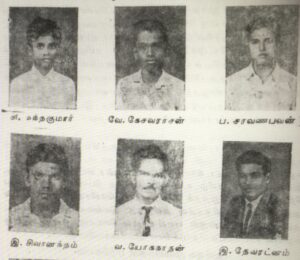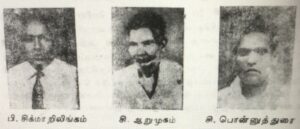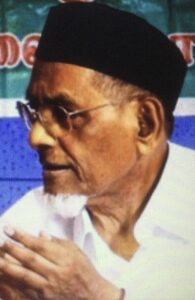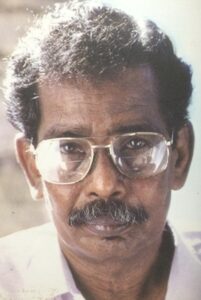Held in Jaffna
by Sachi Sri Kantha, January 10, 2024
In 2014, I had presented my impressions on the 4th International Tamil Research Conference, held in Jaffna, from Jan 3 to 9, 1974. [Please check this link. https://sangam.org/jaffna-international-tamil-research-conference-1974/]
In addition, I had also contributed my thoughts about the tragic deaths of 9 Tamils that occurred on January 10, 1974. It included the pdf file of the 13 page, De Kretser Commission report. It also carried a 4 page foreword written by Dr. V.T.Pasupati and V.Yogeswaran. Only in the foreword, mention is made that “8 lives” were lost. Those interested can check the following link.
[https://sangam.org/1974-jaffna-tragedy-de-kretser-commission-findings/]
In this essay, I identified five ranking culprits who caused this tragedy. They were,
Mr. S.K. Chandrasekera – the then Assistant Superintendent of Police, Jaffna
Mrs. Srimavo Bandaranaike – the then Prime Minister of Sri Lanka
Mr. Chelliah Kumarasuriyar – the then Minister of Posts and Telecommunication
Mr. Badiuddin Mahmud – the then Minister of Education
Mr. Alfred Duraiappah – the then Mayor of Jaffna
For my inferences, please check the provided link above.
When I re-read the de Kretser Commission report, signed by O.L. De Kretser, Rev. S. Kulandran and V. Manickavasagar on Feb 18, 1974 and published by V. Yogeswaran (later to be elected the TULF MP for Jaffna in 1977), I noted that the deceased have NOT been identified by name, though six Tamils who were injured by the police personnel were named (rather incompletely). Even an existing Wikipedia entry with a caption ‘1974 Tamil Conference incident’, as of Jan 9, 2024, does not provide the names of deceased individuals. (https://en.wikipedia.org/wiki/1974_Tamil_conference_incident)
Details about the deceased Nine Tamils
Now for the 50th anniversary I refrain from repeating what appears in my two 2014 essays; but supplement these by providing published references to the dead individuals on that day, that I could gather from old issues of Suthantiran weekly (archived in the Noolaham organization) and other sources.
- Paranjothi Saravanapavan, aged 25 – from Point Pedro. Suthantiran, Feb 10, 1974, p.4
- Velupillai Kesavarajan, aged 14 – from Tholpuram West. Suthantiran, Feb 17, 1974, p.4
- Rasadurai Sivanantham, (age not included, but identified as 21)- from Nachimar Kovil, Suthantiran, Mar 3, 1974, p.5
- Sinnathambi Nandakumar, aged 14 – from Chulipuram. Suthantiran, Mar 10, 1974, p.4
- Vaithianathan Yoganathan, aged 32 – from Kodikamam. Suthantiran, Mar 17, 1974, p. 6
- Navarathinam Rajan Devaratnam, aged 27 – from Nayanmarkaddu. Suthantiran, Mar 24, 1974, p. 7
- John Singa Mariasingam, aged 53 – from Jaffna; a teacher at St. John’s College. Suthantiran, Mar 31, 1974, p. 10.
- Ponnudurai, aged 56 – from Kopay, an Ayurvedic physician.
- Arumugam, aged 60 – from Nayanmarkaddu.
All victims were Tamil males. These deaths provided the sparks for the incumbent Tamil militant movement in the Jaffna peninsula, that was subsequently exploited by the insincere Indian policy makers and intelligence gumshoes, under the pseudo-garb of ‘helping the Eelam Tamils’.
It is also unfortunate that sometimes even American academics interested in the Sri Lankan affairs erred in their interpretation of facts. For example Robert N. Kearney, political science professor of Syracuse University made a passing reference to the Jan 10, 1974 incident as follows:
“In early 1974, an international conference of Tamil studies was convened in Jaffna. Its proceedings were generally limited to scholars until the conclusion when a public session was held. At this session a clash occurred with police, resulting in eight deaths and a number of injuries.”
‘A clash occurred with police’, asserted Prof. Kearney. Really? The irony is that, Prof. Kearney had cited the De Kretser Commission report, where in the foreword of this report it was stated emphatically, “Without the least excuse, a cowardly but well-planned assault was let loose, with tear gas bombs, police batons, rifle butts and other weapons.”


Tamil victims of electrocution in Jaffna on Jan 10, 1974
Writer Dominic Jeeva’s angle
I also provide a following annotation made by Tamil author Dominic Jeeva (1927-2021). He edited and published Mallikai (Jaffna), a Communist Party leaning monthly. In it’s February 1974 issue, Jeeva offered his reasons for boycotting this particular Tamil conference as follows:
‘The President of the Conference and one of the secretaries requested my support in a letter. As for me, I let them know that I have an opinion difference relating to this Conference. But, I’ll not offer resistance or antagonize it. As for me, this Conference could have done some constructive project. They could have set up a Memorial Common Hall. It was not done. All the organizers of this Conference in their badges had only names written in English. If this is so, what was their inner mentality? They publicized that the Conference was from 3rd to 9th. Why did they extend it to 10th? One of the ‘heroes’ of this Conference worked with the thoughts of a parliamentary constituency [note by Sachi: I guess, this was a reference to V. Yogeswaran in 1974, who was later nominated by Amirthalingam the TULF for the 1977 General election. In this election, Yogeswaran was pitted against G.G. (Kumar) Ponnambalam Jr.] This was one of the reason, why some were rejected.
Even in this sadness, one happy news to be recorded. Even after the loss of lives – Jaffna public though excited – racism was not expressed. We should note seriously that not a single Sinhalese was hurt or attempts were made to hurt them. As for this festival, we should recognize this improvement in mentality. Among Jaffna public, racist thoughts didn’t prevail.
Unacceptable behavior of ‘some adventurers’, and to make their acts as that of ‘big men’ by our local politicians as well as lack of patience by the police were the prime reasons for such bad effects.”
Dominic Jeeva’s innuendo about unnamed ‘some adventurers’ relates to T. R. Janarthanam, the then DMK youth front leader.

Prof C. Nainar Mohamed
Dominic Jeeva also published 7 letters (mostly criticizing the Conference and the intents of the organizers) by Dickwela Kamal, S. Chandrakumar, Anbu Jawaharsha, V. N. Pararajasingham, Mutur Muhaideen, ‘Theniyan’ and V. Mahalingam. Pararajasingham had lamented that ‘whatever opinion differences prevailed, exclusion of scholars in the rank of Prof. Kailasapathy, Prof. Sivathamby and Prof. Indrapala appears to be a weighty issue. I don’t know whether the organizers have excluded them, or whether these guys had backtracked from participation. Mutur Muhaideen had pointed out that exclusion of Muslim writers in the caliber of M. Sameem, H.M.V. Mohideen, Ilankeeran and S.M. Kamaldeen was a deficit to Muslim ethnics and Tamil language. I’d categorize these letters as ‘sourpuss letters’ of ‘finding fault’ with the organizers, who were able to arrange and complete a stupendous task, despite all the political road blocks set by the then governing coalition led by madam Srimavo Bandaranaike and their Tamil and Muslim collaborators like Cabinet minister Chelliah Kumarasuriyar, Alfred Duraiappah (the then Mayor of Jaffna) and Communist Party sympathizers among Tamils. Complaining Muslims had ignored the fact that the tragedy was precipitated by the police guys, while the assembled Tamil audience was listening to a spell-binding oratory of Tamil Nadu’s Muslim professor C. Nainar Mohamed (1929? -2014) of Tiruchi Jamal Mohamed College.
I do know, that though Dominic Jeeva as well as the three professors mentioned in the previous paragraph boycotted the Jaffna’s Tamil research conference in 1974 for twisted ‘political reasons’, they did attend the 1981 Madurai International Tamil Research Conference, organized by MGR’s regime.
Description of Journalist S. Sivanayagam
To counter Dominic Jeeva’s pro-Bandaranaike government thoughts, what journalist Sivanayagam had recorded in his 2005 memoirs is given below. Excerpts:
“…Prime Minister, Mrs. Bandaranaike, was already busy snipping off all cultural links with Tamil Nadu by banning the import of Indian films, Indian books and magazines, and making Tamil pilgrim travel to India virtually impossible. The IATR announcement of holding an international Tamil conference in Sri Lanka was certainly unwelcome news to her, but at the same time the Sri Lankan government could not be seen as opposing it. Mrs Bandaranaike’s strategy was to contain any euphoria that the conference could evoke: to that purpose, she offered the Bandaranaike Memorial International Conference Hall (BMICH) in Colombo as the venue for the conference, and whatever assistance that was needed. But this was summarily rejected by the convenors who insisted that it was but logical that a conference involving Tamil studies be held in a Tamil milieu among a Tamil-speaking population. The Srimavo Bandaranaike government showed its small-mindedness by delaying visas to several international scholars until three days before the conference and refusing vias to some Tamil activists from India. While on the one hand the government openly adopted a hostile position, the behavior of some of the leading promoters of the Conference did not smooth matters either…
The Conference, attended by Tamil scholars from many parts of the world was held at Veerasingham Hall, Jaffna from 3 to 10 January 1974. The entire Jaffna town wore a festive air during that week. In a country where the Tamil language was denied any official recognition, and where the Tamil people were themselves groaning under State oppression, what was undoubtedly the greatest international conference held in Jaffna was marred by a tragedy on the final day. If the government in Colombo was antagonistic, the authorities in Jaffna were no less. Jaffna had a mayor in Alfred Durayappa, a Tamil himself but who was a henchman of the government, whose initial reluctance to permit the use of the open air theatre angered the people. Jaffna also had a Sinhalese-dominated police force that was already earning the hatred of the people. What should have been a grand finale to the conference ended in scenes of bedlam and tragedy. It was an unprecedented crowd estimated at over 50,000 never before seen in Jaffna, that had gathered at the esplanade opposite the hall. It was a sea of heads as one could see, reaching up to the moat of the Dutch Fort in the background. A temporary platform was quickly set up in front of the hall, and loud speakers were fixed to electric posts in the vicinity. By the time the proceedings began it was 8 pm. Professor Dr. S. Vidyananthan of the University chairing the meeting invited Dr. Naina Mohamed, a distinguished Tamil scholar from India to speak, and it was while the latter was on his feet that a tragic sequence of events began….”
Writer EsPo’s thoughts

S. Ponnudurai (EsPo, 1932-2014)
Relatively speaking, if there was one fiction and non-fiction writer from Eelam who reached the Nobel prize caliber in the 20th century, it was S. Ponnudurai (pseudonym EsPo, 1932-2014). To the best of my knowledge, one of the perceptive analysis of the events that preceded the Jaffna Tamil conference and its aftermath appeared in EsPo’s 2nd volume of autobiography ‘Varalatril Vaazhthal’ [Living through History], published in 2003. His charming word use in colloquial Tamil embellished with punch and ridicule is rather difficult to translate into English. Nevertheless, I provide translated excerpts below.
“The fear of Sinhalese politicians that suppose the Fourth International Tamil Conference was allowed to be held in Jaffna, the Federal Partyists would take this as an advantage for them, was a natural one….
Ministers Lakshman Jayakody, Kumarasuriyar and MPs Thiyagarajah, Arulampalam and my brother in law MC (note by Sachi: refers to M.C. Subramaniam, a nominated MP in the parliament from 1970-77) led a propaganda from Sinhalese government’s view that ‘the conference should not be held in Jaffna’. In their reports, the anguish of an ethnic group’s cultural thirst and expectations were not considered. They couldn’t provide any reasons beyond the logic that Federal Party will accumulate popular support by this conference.
Among the four modes of political executions, Sinhalese politicians, in their long passage, had lost samam (peace/conciliation) and petham (debate/discord). They did realize only the other two thanam (gift) and thandam (punishment) be of benefit for their dealings with the Tamils. Even about the choice of location to hold the Tamil Research conference, they attempted to use only gift and punishment.
If the Conference is held in Colombo, they will provide all facilities – including the conference hall, lodging facilities for arriving delegates etc. etc. will be taken care of by the government were the attractive ‘carrots’ held in front of the Tamil donkeys. This was the ‘gift’ route of the government. Sinhalese majority had calculated that ‘Jaffna man will show his teeth and bite the money. Those who sided with the government promoted their ballooned view that ‘This indicates how the government is showing its love for Tamil language’.
But the organizers were firm in their stand that the decision to hold the conference in Jaffna will not be reverted. They held the view that the Jaffna soil’s dignity deserve protection and the so-called ‘gifts’ of the government were not needed. The government didn’t anticipate this firm stand. Government’s promotional engines were turned on. There were hidden threats that supporting such a conference by antagonizing the government could be considered as an anti-government act. The then Minister of Education sent a circular to schools that came under his authority that the school hostels should refrain from accommodating the delegates who attend the Conference. Due to passage of time, I cannot remember now all the threats released by the government.
The so-called progressives representing the Murpokku Ezuthalar Sangam (Progressive Writers Front) released reports supporting the government’s stand that the Conference should be held in Colombo. They were never ashamed about these releases. They consider this as their ‘tactics’, and had written history. Because of this stand by them, they gloated that when the Jaffna Campus was established their president Kailasapathy was nominated for the titular head of Campus position. What and when they sold out to achieve something! Anointed positions seems to be the achievements of these Progressives. This is not my accusation. Progressives had accepted and given evidences numerous times about their ‘achievements’… Mainly due to the facts age maturity and non-confrontation, one should ignore historical truths – This view is against the literal religion I follow…
Nine individuals who went to taste the antiquity and sweetness of Tamil language peacefully were sacrificed by government’s aggression. I recognize the false propaganda that had this Conference been held in Colombo, this sort of sacrifice couldn’t have occurred…Suppose the anointed positions received due to the deeds of collaborators become history, those who lost their lives for their love of Tamils should become holy in history. The name details of those who fell for their love of Tamil:
Nandakumar 14 years, Chulipuram; Kesavarajan 15 years, Tholpuram; Sivananthan 20 years, Nachimar Koyil; Devartnam 27 years, Nayanmarkaddu; Yoganathan 28 years, Palai; Ponnuthurai, 54 years, Kopay; Saravanapavan, Paruthithurai; Arumugam, 60 years, Nayanmarkaddu; Singa Mariyasingam 60 years, Jaffna.
I had seen nine nadu karkal (head stones) were placed to the memory of these and they stood valiantly, only to be destroyed subsequently by the dastardly deed by the Sinhalese military. What was the thoughts of youth then? Subsequently, I had recorded in a story memorializing Mithi.”
Mithi was one of EsPo’s sons who was in LTTE and attained heroic death. I note few discrepancies in the ages and native places of the nine deceased recorded by EsPo, and the details I had collected and provided at the beginning. But, I let it stand for factual correctness to the cited sources.
My diary entries
I was 20 then, and had completed my sophomore year at the University of Colombo. Unfortunately, I couldn’t be present in Jaffna during the first week of 1974, though I had an invitation to play flute accompaniment for dance recital in the evening for two days. The reason: That particular week coincided with the end of term examination I had to face at the university, which I couldn’t miss. I provide below translation of my relevant diary scribblings made then.
Jan 1, 1974 Tue: This is the 3rd year of my diary writing. In the afternoon, father of Sri Kantham sisters (no relation to me) visited home and asked whether I can play flute accompaniment for two days, for the dance performances of his daughters. As I have to sit an exam on 7th, I have to reject this offer. A good opportunity missed. But, what can I do?
Jan 3, 1974 Thr: The 4th International Tamil Research Conference began in Jaffna.
Jan 4, 1974 Fri: My thoughts about the Jaffna Tamil Research Conference. I feel anguish that though I had an unexpected opportunity to be there, I cannot be present.
Nevertheless, I feel a bit relieved and pacified myself that noted Tamil scholars from Tamilnadu (like T.P. Meenachisundaran, M. Varadarajan, K.V Jagannathan, K.A.P. Viswanathan) as well as M. Karunanidhi, Nedunchezhiyan, S.B. Athithan, MGR also didn’t attend it.
Jan 7, 1974 Mon: Senior Science Qualifying (SSQ) exam, part I. I had expected all the questions. So, there was no difficulty for me.
Jan 8, 1974 Tue: Visited the temple. Read in yesterday’s Daily Mirror that R. Janarthanam, the DMK student front leader had arrived. They were talking about this in the temple. My memories return to 1968. It was the 3rd term. Same Janarthanam was in Colombo, and he did visit our school. He was invited for an hour talk. But, he arrived 45 minutes later. He began ‘What can I talk in 15 minutes?’, and his revised speech title was ‘Oru Sol’ (One word)’; and he delivered a mesmerizing speech to us.
Jan 9, 1974 Wed: 4th Tamil Research Conference in Jaffna comes to an end today. Today’s Veerakesari daily has a news item stating that R. Janarthanam will make a public speech, and date and title will be announced later. Suppose if he speaks in Colombo, I’ll be there.
Jan 11, 1974 Fri: Saddened to hear the news from Jaffna that police had used tear gas and baton charge on the assembled crowd last night and 10 had died while around 20 were injured. Why such a disgraceful end to a Conference held there? It was announced that the event happened while Prof. Nainar Mohamed was delivering an exhilarating address
Jan 13, 1974 Sun: attended the felicitation meeting held by the Colombo Tamil Sangam to the delegates who had attended the International Tamil Research Conference. At the Ramakrishna Hall. Though I couldn’t attend the Conference, I was able to listen to the brief addresses of Prof. Salai Ilanthiraian, Salini Ilanthiraian, Prof. Nainar Mohamed. In addition, Prof. Vithiananthan and James T. Rutnam also spoke. The best was Prof. Mohamed’s speech. I also enjoyed the thoughts delivered by Salai Ilanthiraian. I noted that when Mr. Rutnam spoke, he was filled with emotion about the sad events that happened on 10th, and he was almost crying.
Cited Sources
Kearney Robert N. ‘Language and the rise of Tamil separatism in Sri Lanka, Asian Survey, May 1978, 18, 521-534’
Dominic Jeeva: Letters on the 4th International Tamil Research Conference. Mallikai (Jaffna), Feb 1974, pp. 51-56.
EsPo: ‘Varalatril Vaazhthal’ [Living through History], vol. 2, Mithra Arts and Creations, Chennai, 2003, pp. 1238-1248.
Sivanayagam: Sri Lanka: Witness to History – a Journalist’s Memoirs (1930-2004), Sivayogam, London, 2005, pp. 166-168.
*****